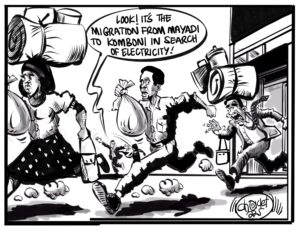The Financial Intelligence Centre (FIC) says it is under siege from criminals who are trying to influence the shut down of the institution so that they can freely conduct money-laundering activities.
And the FIC today disclosed that in the last nine months, the centre recorded a total of about 35, 783 suspicious cash transactions involving over US$ 1 billion, linked to corporate and individual bank accounts.
Meanwhile, the FIC says 50 per cent of the companies investigated which got government contracts are not registered for tax while some belong to politically exposed individuals who front surrogates to conduct business on their behalf.
On Monday, News Diggers revealed that Lusaka lawyer Lewis Mosho had started the process of removing FIC director general Mary Tshuma, by raising criminal charges against her. It was further reported that Mosho and some PF officials wanted to remove Tshuma so that a more submissive director general could be appointed to replace her.
Speaking at a press conference held at Grand Palace Hotel in Lusaka this morning, FIC board acting director John Kasanga confirmed the move, saying criminal elements were targeting senior managers at the institution with false allegations in order to get rid of them.
“Public institutions, especially the FIC have an important role in safeguarding our country from criminal elements. Unfortunately, I must share with you that the FIC is facing real threats from these criminal elements who would like to destabilise the institution. This has taken a form of threats to the personal safety of the FIC senior staff and attempts at spreading false insinuations about its senior management,” Kasanga said.
“So the public must be made aware that the sources of these threats are from the same elements that are committing serious financial crimes. They are the same people who are trying to influence the shut down of the FIC. They are trying to influence negative views about the FIC and its senior staff. Unfortunately, they are also trying to use their proceeds from criminal activities to corrupt other public institutions to further their agenda of trying to neutralize the FIC. So the FIC is under siege. We are under siege.”
Kasanga who was flanked by Tshuma and board director Daniel Katongo, said the FIC had identified the criminals behind the maneuvers because their illicit financial activities were already on the institution’s database.
“A weakened FIC will enable such elements to continue to commit crimes without anyone recording what they have done, or putting together the evidence required by law enforcement agencies to prosecute them. But what these individuals don’t realise is that the FIC knows who they are because their activities are documented. What has been documented cannot be erased by eliminating individual members of staff of the FIC,” Kasanga said without mentioning Mosho.
“So they can try and destabilise, but as long as we continue to have government support over the ideals of maintaining the FIC, that information will always be there for anyone to use if they want to prosecute. So trying to threaten individuals will not help. The best they can do is to stop getting involved in criminal activities; that is the answer. We would like to assure the public that the FIC remains undaunted and we remain committed to discharging our mandate professionally and without fear of favour,” he said.
“Our appeal to stakeholders especially reporting entities and law enforcement agencies, is to work with us collaboratively and to always put the national interest at the centre of what they do as they discharge their mandates. If they do that, a lot of the problems that we are facing could be much more easily addressed because we would fight together. We should not provide hiding places for criminals. In other words, we must say no to corruption, at least not on my turf.”
And during the question and answer session, Tshuma also confirmed that she had received threats from criminal elements who were trying to remove her from office.
In terms of officers of the FIC, including myself being targeted for the work that we do, when we entered the Financial Intelligence Centre circle. We signed up for such kind of things. So our job comes with different kinds of threats. Of course, the purpose of money laundering for criminals is to hide who is behind it. And so when the criminals feel threatened that you are getting to the bottom of what they are doing, obviously you receive different kinds of threats,” Tshuma said.
“So threats have been part of our lives. I can confirm that we do receive such kind of threats, but I cannot say that there is a court case that is going on against any FIC officer that has been established as yet. But threats have been received by difference officers of the centre.”
Earlier before talking about the threats that the institution had been receiving, Kasanga disclosed that between January and September 2017, over US$ 1 billion had been reported in various suspicious cash transactions.
He said the trend of people playing around with colossal volumes of money had worsened since 2016.
“Financial crimes pose a serious threat to Zambia’s national security and economic stability. The FIC has noted with concern that the trends noted in 2016 are getting worse. Every Zambian is affected when taxes are not collected due to tax evasion or corruptions, as these result in the diversion of scares resources to individuals rather than the public,” he said.
“Over the nine months from January to September 2017, there are additional trends that we have been picking up that are worrisome; and we would like to share these with the public. With regards to cash transaction reports, we established that there are a lot of transactions which are happening in cash where people from nowhere go and deposits trunks of money in an account or they will try and withdraw large amounts of cash. You don’t know where that cash has come from and when they withdraw, you don’t know who they are paying.”
He said during the period under review, close to US$1 billion was suspiciously deposited in company accounts, while US$72 million was deposited in personal bank accounts.
“For example, with companies and established businesses, we noted withdraws which were large amounts of cash. There were about 8,277 such transactions, involving K1.8 billion and on the dollar side, US$8.8 million. Coming to cash deposits which also didn’t add up, especially those entities that you know that they would not ordinarily be trading in cash. We had 17,000 such transactions, involving K3.6 billion and, wait for it, US$ 883million, you know what that amount is; just below a billion dollars,” Kasanga said, adding that there were several other millions of dollars detected in unclassified cash transactions involving companies and individuals.
“With regards to individuals, the suspicious transactions that were of concern to us, we picked up 1,884 transactions and those involved, K483.8 million and then US$6.4 million. So we have a lot of individuals playing around with a lot of cash. And when it came to deposits, we picked up about 3,369 transactions which involved K548 million and on the dollar front, wait for it, US$71,9 million dollars that people are playing around with. These suspicious transactions were processed by our financial institutions and what is significant about this is that they are based on people transacting in cash, which makes it difficult to trace the source of the money. And for those who are paying, you don’t know who is being paid from these withdrawals.”
He said company owners were avoiding tax by transacting with personal bank accounts.
“Then we also picked up that there are a lot of individual accounts that are linked to companies, where individuals are receiving more money than the companies that they are working for, which is going into individual accounts. People use this to evade tax in a number of cases. And then we also saw that a lot of the major sources of these cash deposits were from the trading commodities. The main commodities were fertilizer, maize and soya beans. Such illicit funds were being used to buy maize and export; then the proceeds would come into the normal bank accounts. So it’s a way of laundering money where all you see is the maize being sold, but how that maize was procured, there is no record of it,” Kasanga explained.
“I should also mention that the information we have does not give you the total picture because this is just where we have got the information, but there are other things happening in the economy that we can’t pick up. We also want to share with you the results of the suspicious transactions over the nine months period. We picked up a total of K664 million which was completely suspicious transactions and the value of this was US$53.3 million. What is notable about this, 45 per cent of these transactions were associated with tax evasion, amounting to K300 million.”
And Kasanga said many companies which were getting government contracts were suspiciously owned and not registered for tax.
“We have also been monitoring the tenders awarded by statutory agencies and parastatal companies. It is rather disappointing to share with you the results of this analysis. It indicated that about 50 per cent of the contract awarded by these institutions, this year so far, have been awarded to entities that are not registered for tax. Others are not tax compliant. But being tax compliant is a perquisite to be awarded a public contract,” he said.
“So from what we analysed, because we didn’t analyse all the contracts, about 50 per cent are being awarded to people who are not even registered. Again about 50 per cent of the companies had no capacity to contract; in other words, some are companies that have just been registered. They just put in a tender and they are given, they have no track record of having been in operations. Some companies were even unregistered. So you have public contracts being awarded to entities that are not even registered. We also established that a number of these contracts were based on single sourcing. Somehow they were just single sourced and no one even new that contracts had been awarded, people just started executing the contracts.”
He said politically exposed persons were using surrogates to win government contracts.
“We also established that some of these companies that are getting public contracts, their ownership is very opaque. When you check at PACRA, you find that the names of the companies differ from the people who are purporting to be the owners of the companies. So what is happening is that a number of companies are surrogates. The people being shown to be the fronts of these companies are surrogates. Most of such cases involved what we call politically exposed persons who are using their associates to conduct business on their behalf because officially they are banned from participating in certain bids,” said Kasanga.
“The FIC was in the recent past approached to conduct due diligence investigations on entities that are trying to offer loans to the government directly and to the parastatals. What we have found out is that some of the sponsors and their Zambian accomplices have criminal backgrounds. So they overprice the cost of the loans obviously aimed to swindle. And the government, as a guarantor has to bare the burden of the increased cost of a simple commercial loan. So its another way of stealing money from public resources.”























